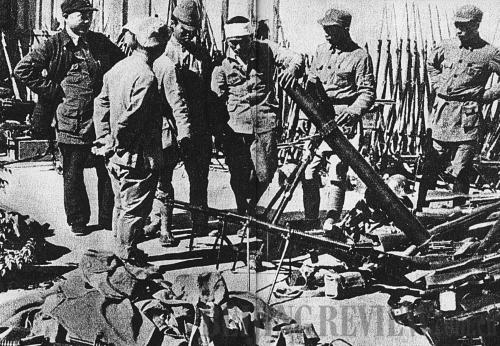

UP IN ARMS: Japanese soldiers surrender their weapons to the Chinese army during the war (XINHUA)
Sino-Japanese relations
The international order forged after WWII contributed to the general peace in Asia for almost seven decades, a period during which Japan has risen to be one of the most important global economies.
China had decades of friendly relations with Japan after the two countries established formal diplomatic ties in 1972. However, since 2012, those ties have become strained as the Japanese Government and right-wing politicians have continued to repeatedly cross the line with China on historical issues.
The relations between the two countries started to further deteriorate after Japanese Prime Minister Shinzo Abe took office in late 2012, and they flared up when Abe visited a notorious war shrine on December 26, 2013.
The latest confrontation between China and Japan came on August 15 as Japanese Cabinet ministers paid their respects again at the Yasukuni Shrine.
Abe sent a ritual offering to the shrine, which honors 14 Class-A Japanese war criminals, and this, in addition to the visits made by ministers and lawmakers, has further ratcheted up tensions between Japan and China.
According to Zhou Yongsheng, a professor of Japanese studies at China Foreign Affairs University, huge ambitions for military expansion and even preparations for wartime operations have been placed on Japanese Prime Minister Abe's agenda, and this radical policy campaign looks set to continue.
In April, Japan eased arms export rules, approving its first weapons exports in July. Japan's Mainichi Shimbun newspaper said the Defense Ministry is also looking at new ways to incorporate civilians into the military in special circumstances.
"It's a dangerous signal that also appeared before the war," said Li Wei, Director of the Institute of Japanese Studies at the Chinese Academy of Social Sciences. "Japan's aggression had its roots in the society of militant Japan. When deciding to invade China, wage the Pacific War, and attack Southeast Asia, Japanese rulers said they were 'fighting for survival' and many Japanese believed such nonsense."
"The similar hysteria in Japanese society today must be rooted out in order to win the trust of China and other Asian countries, and that requires the Japanese leadership to adopt an accurate view of history," Li added.
Copyright ©1999-2018
Chinanews.com. All rights reserved.
Reproduction in whole or in part without permission is prohibited.